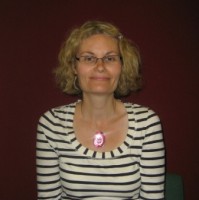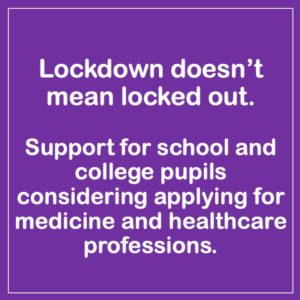 Today on the MDS Outreach blog we have a post from Jenny Mullins-White, Careers Consultant in the Careers Network at the University of Birmingham. Her blog is brimming with brilliant ideas of how you can prepare for a future career in medicine and healthcare by finding out more about these professions and yourself while in lockdown.
Today on the MDS Outreach blog we have a post from Jenny Mullins-White, Careers Consultant in the Careers Network at the University of Birmingham. Her blog is brimming with brilliant ideas of how you can prepare for a future career in medicine and healthcare by finding out more about these professions and yourself while in lockdown.

I don’t think anyone could have anticipated the impact of COVID 19 on all of our lives. With so much attention on helping to find a vaccine, through to caring for those affected and preventing its spread, the spotlight has shone on the health and scientific sectors and the people within it. But you already know how important these careers are and you want to train for a career in health. Right now, you are thinking about your application too and how you can best prepare. What I want to do is to help you make sense of what is happening and what you can be doing too.
Making sense of what is happening now.
Not since the Second World War has the world been affected by a single issue. The pace of change is extraordinary and it can be unsettling. I started to watch the news several times a day; now I only check the BBC website once a day. I find it too much at times and I had elderly relatives who are vulnerable and needed my support and time. You may be feeling the effects on your family and are worried too. If you are able to, use this time of lockdown to work on understanding the role of the doctor and other healthcare professionals and how you can demonstrate the knowledge, skills, qualities and experience needed for university and these careers in the future.
Use COVID 19 as an opportunity to find out about the challenges facing the health sector.
With Public Health high on the nation’s agenda, keep track of all the developments and the key agencies involved in fighting the virus. Find out how Professor Chris Whitty works with the government as the Chief Medical Officer. You can even research his career path on LinkedIn.com There are many news items showing the human face of working as a doctor/healthcare professional in the NHS, by going on the BMJ website, you can see how doctors are talking about the issues and compare this with the BBC website or a daily newspaper.
Use this time to research and use good resources.
Find out about the different medical specialties, whether it is hospital or community based. You can explore the medical specialities here. Aim to get a sense of the wider MDT and how the team is vital. There are some excellent videos on the NHS YouTube channel where you can watch from a range of professionals, working together to support the medical team. To get the personal stories, follow medics on Twitter or Instagram; start with @CMO_England, @uksciencechief @MattHancock or hashtags #COVID19 #coronavirus #PPE Keep a note of the key messages.
Write a reflective journal.
Applying to medicine is about you and what makes you you. A reflective journal or diary provides an opportunity to think about what you see and hear; what do you notice about your feelings and reactions? What has struck you about those involved in the health care sector? It might be helpful to jot down how you might feel in that situation and who you might want to share those thoughts with. Both your personal statements and multiple mini interviews (MMIs) will address your thoughts and feelings. You might even want to start a blog or vlog.
Identify what you have to offer
We can find out about what makes a good doctor and the values of those working in the NHS. But work experience and shadowing provides real experience. And whilst thousands of people have been able to volunteer for the NHS, we know how much harder it’s been for under 18s. Medical schools do understand the enormous challenges students face in getting work experience, especially during the COVID 19 outbreak. So whilst it just might not be possible or safe to get patient centred work experience they will understand. But you will still have things to offer and now is a good time to write down all of the previous work experience and voluntary work that you have done. Maybe you’ve volunteered to raise money for a charity or supported younger students in school with their learning. Maybe you were a study buddy or mentor. Part time jobs with customers? Anything that shows commitment, dedication, support, listening and talking is useful for your application and MMIs. What about the things that you are doing whilst in lockdown? Whether it’s caring for family, looking out for elderly neighbours or keeping in touch with your classmates; these still count. Remind yourself of the qualities you have and the experiences you have gained from school/college, sports clubs, societies, charities and voluntary groups. This will all be helpful when you come to draft your personal statement and focus on your achievements. At interview you will have examples to use too.
You’ve got this!
Whilst the world may seem unsettling, there are still things that you can do to stay positive and help your application to medical school. Lockdown shouldn’t mean locked out…. use this time to research and reflect on what you have done and can do now. Good luck and stay safe!
Jenny Mullins-White, April 2020
Jenny is a Careers Consultant at the University of Birmingham. She has worked in schools, colleges and universities and helped thousands of young people to apply to medicine and health related courses. She supports current students at the College of Medical and Dental Sciences and contributes to the Routes to Profession programme.
A huge thanks to Jenny for all the time and effort she put into putting this blog together.
You can find out more about Jenny and engage with her here:
LinkedIn
Twitter
MDS Outreach can be found using the following links:
Web: www.birmingham.ac.uk/MDSOutreach
Twitter: @UoB_MDSOutreach
Instagram: @uob_mdsoutreach
Blog: https://blog.bham.ac.uk/mds-outreach/
Email: MDSOutreach@contacts.bham.ac.uk
